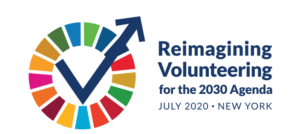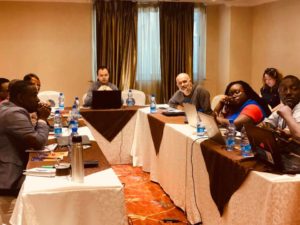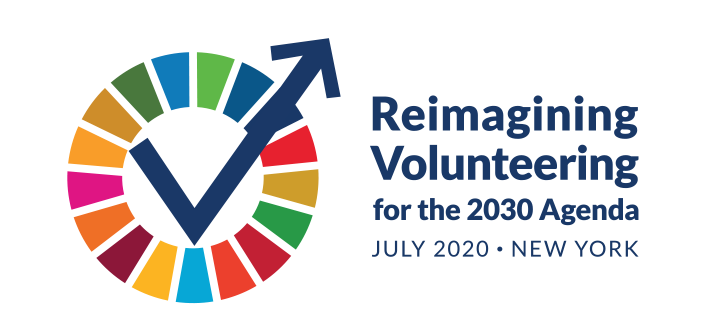United Nations Volunteers Innovation Challenge: volunteering, activism and SDG 16+
Cecilia Milesi (Founder and CEO Global Change) and Erika Lopez Franco (independent researcher and facilitator) are one of the awardees of the United Nations Volunteers (UNV) Innovation Challenge.
Cecilia and Erika will be modeling an adaptive framework that will support organizations around the world to value, understand, recognize, and celebrate how volunteers and activists contribute to building more peaceful, just, inclusive, and accountable societies. In particular, in those contexts, where violence or violent forms of community interaction are on the rise.
Cecilia and Erika expect their adaptive framework will enable staff from non-governmental, governmental volunteering programmes, volunteers themselves, and most importantly the local communities to assess how volunteers and activists’ actions are contributing the achievement of SDG 16+ targets and the prevention of violence in a changing and complex world -with a particular focus on women, youth participation and the potential relevance of South-South Cooperation as a framework for collaboration.
The full paper can be downloaded here:
- Final Version_Volunteer Contribution to SDG16_CMELF_Final_25052020_pdf
- Adaptive Framework_Annex I & II_FINAL
The paper will be presented during the upcoming High-Level Political Forum, 2020 and the Global Technical Meeting (GTM2020) on ‘Reimagining Volunteering for the 2030 Agenda’. More information and registration for the event here: https://unitednationsvolunteers.swoogo.com/gtm2020/479540?lang=en
 UN Secretary General call for a Decade of Action
UN Secretary General call for a Decade of Action
To ensure the world achieves the vision articulated in the 2030 Agenda, UN Secretary-General Antonio Gutierrez has called on all sectors of society to mobilize for a Decade of Action on three levels: global action, local action, and people action. A billion volunteers worldwide are ready to answer the call at all three levels. From providing medical care to patients diagnosed with the coronavirus to tackling climate action, from giving technical assistance to monitoring post-disaster reconstruction, an estimated one billion people are volunteering globally in different ways and with different capacities – often working without adequate support or recognition.
The United Nations defines volunteer activities as those “undertaken of free will, for the general public good and where the monetary reward is not the principal motivating factor.”
As part of a concerted effort to better understand volunteerism and to find ways to further unleash, empower and support its enormous potential for the Decade of Action, the United Nations Volunteers programme (UNV) and the International Federation of Red Cross and Red Crescent Societies (IFRC) are reviewing the role of volunteerism in achieving and localizing the SDGs.
The challenge remains to effectively measure, monitor, motivate and mobilize this workforce of 1 billion volunteers.
To respond to this challenge, a Global Technical Meeting (GTM2020) on ‘Reimagining Volunteering for the 2030 Agenda’ will take place at the United Nations in New York in July 2020 to provide a platform to advance the discourse on volunteering for the Sustainable Development Goals (SDGs). More than 400 representatives from governments, UN agencies, funds and programmes, civil society, academia, volunteer groups and the private sector will come together to join forces to support volunteerism as a driving force for positive change.
Central to this effort are four cross-sectoral and integrated “workstreams” that support the overarching theme “Reimagining Volunteering for the 2030 Agenda”. These are currently underway and will provide important evidence-based policy recommendations that will ultimately be articulated in a Call to Action for Governments, academia and civil Society to act.
- The first workstream is mapping evidence and documenting trends on the ground in how volunteering has contributed to the first cycle of the SDGs and is identifying challenges and opportunities that lie ahead in the remaining ten years.
- The second workstream looks at a bigger picture of complex global problems and how volunteerism as a transformative force can offer comprehensive solutions that ensure no one is left behind on the journey to 2030.
- The third workstream is researching what environments are most conducive to empowered volunteerism – that is, what policy frameworks or regulatory environments are best suited to the mass mobilization, support and empowerment of volunteers. Also practical tools for VIOs to be more effective.
- The fourth workstream seeks ways to define and measure the enormously positive impacts of volunteerism in a manner that can clearly inform national development priorities and allow for accurate reporting on results.
Measurement
Our world is changing fast, yet the tools used to measure and evaluate progress remain rooted in the past. Blunt economic tools such as Gross National Product (GNP) continue to serve as the primary benchmarks for human achievement yet they obscure inequalities between and within countries and are unable to true human development. The fourth workstream explores different ways to measure the scale and scope of volunteering, its contributions to the SDGs and its impact. It looks at the existing models, and assesses their shortcomings, while exploring new and innovative ways to measure. It is intended to explore how improved measurement of volunteering could add value to the planning, monitoring and integration of SDGs into national and global action plans. Improved quantifiable measurement metrics could also provide rationale to government policymakers to allocate resources and to legislate conductive regulatory frameworks that support and empower volunteers.
Measuring the scale and scope of volunteering is important. To date, there has been limited investment in building from academic research to consider models for integrating volunteering into policy debates at national or sub-national level. Bridging this gap could help nurture volunteering and its most positive contributions both for individuals and for societies. Looking at ways of valuing volunteering beyond its contribution to GNP could also help think about what measures of success that governments and others can use more strategically to help understand the well-being of populations.
Innovation challenge
The true added value of volunteering to a society goes far beyond the hours that people contribute and the tasks that they perform. The impact of volunteering is multi-faceted, for both volunteers and for others. But to measure and monitor volunteering, and thus better understand the enormous value that it brings to societies, will require innovative research and out-of-the-box thinking. Knowing this, UNV and its partners launched an Innovation Challenge in December 2019, calling on innovators working in the field of social science, economics, governance and other areas to generate ideas of how to use existing data on volunteer work to help understand four key dimension of volunteering:
- Analytical aspects: Potential qualitative and quantitative analytical frameworks or models that could help understand the contributions of volunteers at community, district, municipal or national level to the SDGs.
- Alternative data sources: Identification of freely available data sources that can be combined to provide insights or analysis on volunteerism and how would this be done.
- Measurement models: Use of supplementary indicators or targets that could better integrate an understanding of citizen contributions under specific SDG goals, targets or indicators.
- Development models: Can analytical models incorporating volunteering tell us more about the nature and quality of human development?
Through a global appeal and request for proposals, eight organizations were selected from Argentina, Ethiopia, Ghana, Kenya, Kyrgyzstan, Peru, Togo and the United Kingdom. Each will produce a 5,000-word paper based on their proposal and will also participate in Innovation Challenge activities as part of a community of practice convened under this initiative. The papers will be published as part of an anthology for the Global Technical Meeting on Volunteering 2020 and will also inform a toolkit being developed on the measurement of volunteer work by UNV.
Innovation challenge research projects
Argentina: Global Change
The Buenos Aires-based Global Change is working on modeling an adaptive framework that will support volunteering organizations around the world to value, understand, recognize and celebrate how volunteers contribute to building more democratic, accountable and peaceful societies. In particular, in those contexts where there is an increasing “closing civic space” and where violence or violent forms of community interaction are on the rise.
The researchers expect their framework will enable staff from non-governmental, governmental volunteering programmes, volunteers themselves, and most importantly the local communities to assess how volunteers’ actions are contributing to achieve those SDG targets that work to prevent violence in a changing and complex world -with particular focus on women, youth participation and prevention of increasing climate change crisis.
Ethiopia: Tesfaye Yimer Ali
Tesfaye Yimer Ali of Ethiopia is analyzing existing official national level statistics and data in an attempt to measure national level volunteer information such as number of volunteers, volunteer hours and economic value of volunteering. He hopes the results of his research will inform improved national policies that promote and support volunteerism.
Ghana: Afrobarometer
Afrobarometer is a pan-African, independent, non-partisan research network that measures public attitudes on economic, political, and social matters in Africa. Its secretariat headquarters are in Accra, Ghana. Within the context of this assignment, they have appointed two researchers to analyze Afrobarometer’s extensive data on civic engagement, disaggregation by key socio-demographic indicators (e.g., age, gender, education, economic status) to help build a profile of who participates most actively, and to map out trends in civic engagement over time, a critical factor in understanding the role volunteerism and citizen action can play in the Decade of Action for the SDGs.
Kenya: Usitawi Consultants
Usitawi Consultants Africa Ltd is working to quantify the contribution of volunteer work to Kenya’s economy. Their research, commission by the Government of Kenya through their Ministry of Labour and Social Protection, was also accepted as an Innovation Challenge under this framework. It is hoped the results of this research will help calculate the labour input of volunteer employment to the national production of goods and services. Specifically, the research objectives are to:
- Establish the types of volunteering and trends in the volunteer sector in Kenya
- Establish the determinants of volunteer work in Kenya
- Establish the annual economic value of volunteering in Kenya
- Recommend appropriate policy options and reforms required to facilitate sustained volunteer work growth in Kenya
Kyrgyzstan: El-Pikir Center for Public Opinion Study and Forecasting
In Kyrgyzstan there is no institutional framework or common understanding of “volunteering” the way most people understand it in other countries. However, there exists a culture of contribution, both materially and of labour, to the good of society. Some of this tendency may have emerged from centuries of Ottoman rule, when an “ashar” was imposed on communities by the authorities. The El-Pikir Centre for Public Opinion, within the context of this research endeavor, is conducting extensive field research to gauge public perceptions of volunteer work, and readiness of different kinds of actors to participate in the future activities related to national SDG priorities.
Togo: Agence Nationale du Volontariat du Togo (ANVT)
Togo’s National Volunteering Agency is developing a framework to measure, monitor and evaluate the contribution of national and international volunteers to key development sectors. Working closely with the National Institute of Statistics and Economic and Demographic Studies (INSEED), France Volontaires and the Federation of Volunteering Organizations of Togo, ANVT . hopes to create a econometric model that will help evaluate the contribution of volunteerism to the reduction of the unemployment rate among Togolese youth.
United Kingdom: Jump Projects Ltd
Jump Projects of Britain is assessing, analyzing and interpreting vast sets of public data related to health and wellbeing alongside other variables such as trust in others, sense of belonging and social mixing (mixing with people of different backgrounds). It is conducting an innovative, scientific, data-led analysis of nationally representative surveys through the lens of the SDGs to better understand the role of volunteering as it relates to the institution of the Church and faith communities.
For more details see www.volunteerSDGs.org & www.unv.org/planofaction
SPANISH
 Cecilia Milesi (Global Change) y Erika López Franco (investigadora independiente y facilitadora) fueron seleccionados beneficiarios del Desafío de Innovación de Voluntarios de las Naciones Unidas (UNV).
Cecilia Milesi (Global Change) y Erika López Franco (investigadora independiente y facilitadora) fueron seleccionados beneficiarios del Desafío de Innovación de Voluntarios de las Naciones Unidas (UNV).
En preparación para la Reunión técnica mundial sobre voluntariado 2020 ‘Re-imaginar el voluntariado para la Agenda 2030’ (GTM2020), la UNV y sus socios están llevando a cabo una iniciativa de innovación para explorar las contribuciones económicas y sociales del voluntariado. El desafío está generando ideas sobre cómo aplicar los datos existentes y la investigación sobre el voluntariado a la Agenda 2030. Las ideas se presentarán durante el GTM2020 que tendrá lugar durante el Foro Político de Alto Nivel sobre Desarrollo Sostenible (HLPF) de la ONU en 2020.
Los siete grupos de investigadores seleccionados investigarán y escribirán un artículo que se publicará en una antología en junio de 2020 y estará disponible en www.unv.org/planofaction, www.volunteerSDG.org y en otros lugares con el objetivo de informar a los estados miembros de la ONU y organizaciones multilaterales sobre enfoques innovadores para valorar y medir las contribuciones de millones de voluntarios al logro de los ODS.
Cecilia Milesi y Erika López Franco crearán un marco de análisis adaptativo que ayudará a las organizaciones de todo el mundo a valorar, comprender, reconocer y celebrar cómo los voluntarios contribuyen a construir sociedades más democráticas, responsables y pacíficas. En particular, en aquellos contextos donde hay un creciente “espacio cívico cerrado” (closing civic space) y donde la violencia o las formas violentas de interacción comunitaria están en aumento.
Por lo tanto, Cecilia y Erika esperan que su marco de análisis permita que los programas de voluntariado gubernamentales, no gubernamentales, los propios voluntarios y, lo que es más importante, las comunidades locales, evalúen cómo las acciones de los voluntarios contribuyen al logro de los objetivos del ODS 16+ y la prevención de la violencia en un mundo cambiante y complejo, con un enfoque particular en las mujeres, la participación juvenil y la relevancia potencial de la Cooperación Sur-Sur como marco de colaboración.
Los otros seis grupos de investigadores están trabajando en diversos contextos y tienen una amplia experiencia en apoyar la participación ciudadana y el voluntariado. Ellos son Tesfaye Yimer Ali (Etiopía), Afrobarómetro (organización panafricana), Usitawi Consultants (Kenia), El-Pikir Center for Public Opinion (En Kirguistán), Agence Nationale du Volontariat du Togo (ANVT, Togo), Jump Projects Ltd / Estado de la vida (Reino Unido). La comunidad de práctica de los investigadores celebro su primera reunión en Etiopía a principios de marzo, con el objetivo de compartir ideas.Los hallazgos, las propuestas y las lecciones se presentarán durante la Reunión técnica mundial (GTM2020) sobre “Reimaginar el voluntariado para la Agenda 2030”. La reunión tendrá lugar en las Naciones Unidas en Nueva York en julio de 2020 para facilitar una plataforma para avanzar en las discusiones y debates sobre el voluntariado para los Objetivos de Desarrollo Sostenible (ODS) y dar forma conjunta al futuro del voluntariado. Se espera que asistan al evento más de 400 representantes de gobiernos, agencias de la ONU, fondos y programas, sociedad civil, academia, grupos de voluntarios y el sector privado.
Basado en la Resolución de la Asamblea General de las Naciones Unidas A / RES / 73/140 titulada ‘Voluntariado para la Agenda 2030’, el programa de Voluntarios de las Naciones Unidas (UNV) y la Federación Internacional de Sociedades de la Cruz Roja organizan conjuntamente el GTM2020 como evento especial durante el Foro Político de Alto Nivel de la ONU sobre Desarrollo Sostenible (HLPF) en 2020.
La reunión fue convocada en el Plan de Acción para Integrar el Voluntariado en la Agenda 2030, propuesta por el Secretario General de las Naciones Unidas en 2015, a solicitud de la Asamblea General en 2012. Bajo la facilitación y coordinación de la Secretaría del Plan de Acción, en los últimos tres años se llevaron a cabo una serie de actividades, incluidos los análisis nacionales de la situación de los Estados miembros de la ONU, que se incorporaron a cinco informes de síntesis regionales. Con base en estos informes, se realizaron consultas regionales al margen de los Foros Regionales sobre Desarrollo Sostenible facilitados por la ONU. Estas consultas proporcionaron evidencia y datos sustantivos para alimentar el debate de GTM2020. Además, varios miles de personas de todo el mundo compartieron sus puntos de vista e ideas a través de consultas en línea sobre la reinvención del voluntariado. Obtenga más información sobre los procesos de consulta aquí.
Para más detalles ver www.volunteerSDGs.org

